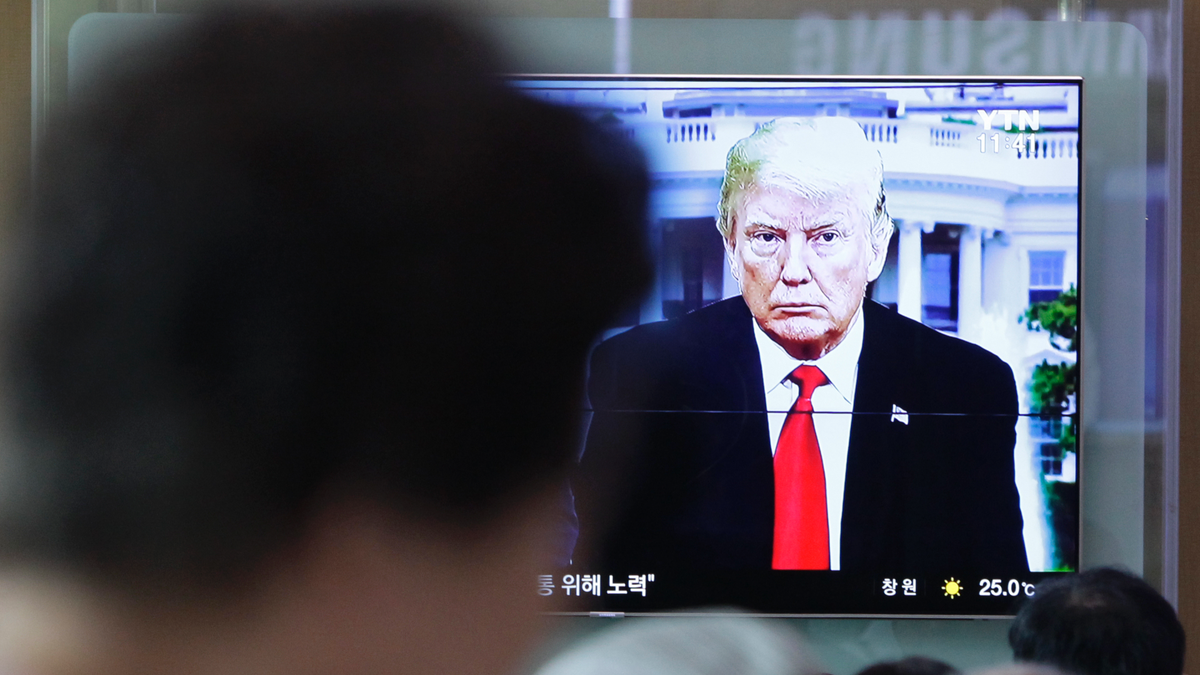
WASHINGTON – A White House team is heading to Singapore this weekend as previously planned to prepare for a possible summit between President Donald Trump and North Korea's leader, a further sign that the meeting Trump called off might get back on track.
Trump on Friday welcomed the North's conciliatory response to his letter withdrawing from the June 12 meeting and said it was even possible the meeting with Kim Jong Un could take place on the originally planned date.
"They very much want to do it; we'd like to do it," he said. Trump later tweeted that the two countries were "having very productive talks."
On Saturday, White House spokeswoman Sarah Huckabee Sanders said a team will leave for Singapore as scheduled "to prepare should the summit take place." The team will be led by Joe Hagin, deputy chief of staff for operations.
These developments, combined with a surprise meeting Saturday between Kim and South Korea's president, Moon Jae-in, rekindled hopes of progress toward halting the North's nuclear weapons program.
Meeting at a border truce village, Kim and Moon discussed carrying out the peace commitments they reached in their first summit, as well as Kim's potential meeting with Trump, Moon's office said. Moon was expected on Sunday to reveal the outcome of the meeting.
White House officials noted that Trump had left the door open with Thursday's letter to Kim, which blamed "tremendous anger and open hostility" by Pyongyang for his decision to pull out of the summit but also urged Kim to call him.
By Friday, North Korea had issued a statement saying it was still "willing to give the U.S. time and opportunities" to reconsider talks "at any time, at any format." Trump rapidly tweeted that the statement was "very good news" and told reporters that "we're talking to them now."
Trump views the meeting as a legacy-defining opportunity and has relished the press attention and the speculation about a possible Nobel Peace Prize. He made a quick decision to accept the meeting in March, over the concerns of many top aides, and has remained committed, even amid rising concerns about the challenges he faces in scoring a positive agreement.
Asked Friday if the North Koreans were playing games with their communications, Trump responded: "Everybody plays games. You know that better than anybody."
He did not detail the nature of the new U.S. communication with the North. At the Pentagon, Defense Secretary Jim Mattis said "diplomats are still at work on the summit, possibility of a summit, so that is very good news." He characterized the recent back-and-forth as the "usual give and take."
The U.S. and North Korea do not have formal diplomatic relations, complicating the task of communicating between the two governments. Under the Trump administration, the CIA, where now-Secretary of State Mike Pompeo served as director, has taken an unusually prominent role in back-channel negotiations.
Pompeo last year assembled a working group at the CIA called the Korea Mission Center, which gradually assumed the lead role in talks with the North Koreans, and the group's director, a retired senior CIA official with deep experience in the region, became the main U.S. interlocutor with Pyongyang.
The group did not supplant the State Department's traditional mode of communication with the North, which is known as the "New York Channel" and involves U.S. diplomats and their North Korean counterparts posted to the United Nations. But it did play the major role in organizing Pompeo's two trips to Pyongyang, once as CIA director and once as secretary of state.
Trump, in his letter to Kim, objected specifically to a statement from a top North Korean Foreign Ministry official. That statement referred to Vice President Mike Pence as a "political dummy" for his comments on the North and said it was up to the Americans whether they would "meet us at a meeting room or encounter us at nuclear-to-nuclear showdown."
Trump then said from the White House that a "maximum pressure campaign" of economic sanctions and diplomatic isolation would continue against North Korea — with which the U.S. is technically still at war — though he added that it was possible the summit could still take place at some point.
U.S. defense and intelligence officials have repeatedly assessed the North to be on the threshold of having the capability to strike anywhere in the continental U.S. with a nuclear-tipped missile — a capacity that Trump and other U.S. officials have said they would not tolerate.
Trump, speaking Friday to graduates at the U.S. Naval Academy, did not mention North Korea directly, but he stressed the United States' military might.
He said, "The best way to prevent war is to be fully prepared for war."
___
Associated Press writers Matthew Lee and Robert Burns contributed to this report.

